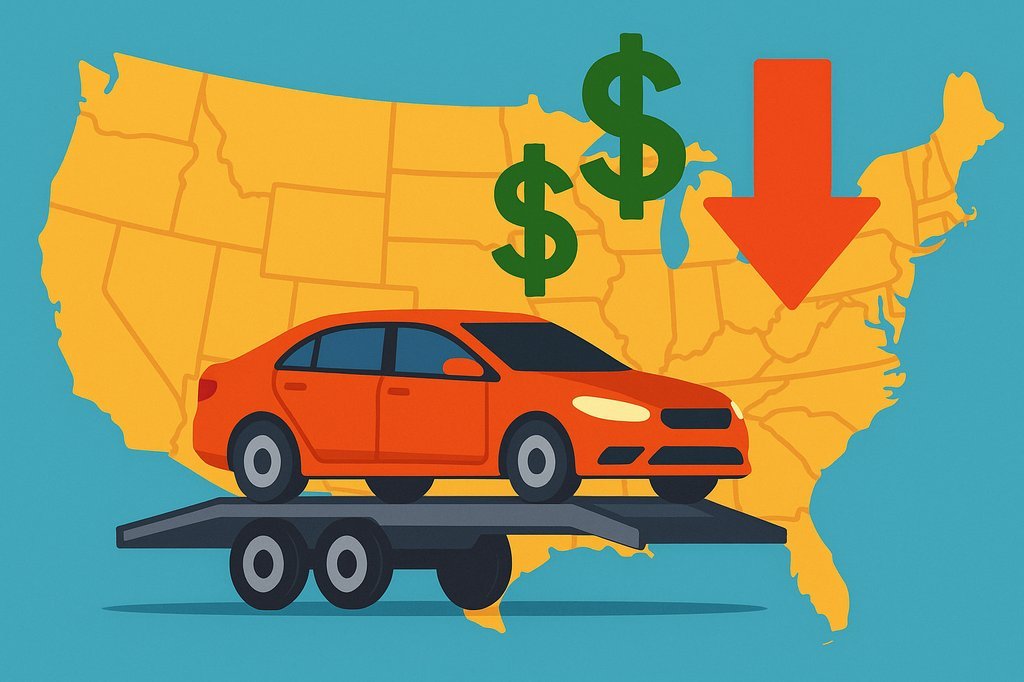Anyone trying to figure out the cost to ship a car per mile quickly notices that no two quotes look the same. Prices can swing by a few hundred dollars even on the same route. It often leaves people wondering whether they are being overcharged or if the lower offer might be hiding something. The truth is, rates follow a pattern, but there are always details that shift the numbers. Once you understand how carriers look at distance, vehicle type, and timing, those quotes start to make more sense. It becomes easier to spot which option actually is the cheapest without sacrificing reliability.
Haulers calculate mileage differently depending on the route. A straight run on the interstate with easy pickup and delivery points usually costs less per mile. Remote areas or crowded urban streets can add fees because they complicate loading. Seasonal demand also plays a role. Summer tends to be busier and pricier, while winter routes might drop in cost unless snowstorms slow everything down. These moving parts are why quotes seem inconsistent at first glance.
Factors affecting car shipping quotes
Carriers do not pick numbers out of thin air. They factor in distance, type of trailer, fuel costs, and the weight or size of the vehicle. An SUV takes up more space than a compact sedan. A motorcycle needs different gear for safe tie-down. Luxury or classic vehicles often require enclosed trailers with climate control. Each of these layers adds to the overall cost.
Scheduling can be just as critical. A flexible pickup window lets a driver fit your car into an existing route, saving time and money. Demanding exact pickup and drop-off hours narrows those options and can push rates higher. Even fuel prices and driver availability shift week by week. This is why most haulers caution that quotes are estimates until dates and details are locked in. For a deeper look at trailer types and what they mean for your wallet, you can check here: vehicle transport options.
The average price per mile for car shipping tends to start lower on long hauls. A coast-to-coast trip might come out to around 40 to 60 cents per mile. Shorter runs, say under 500 miles, may feel more expensive per mile because the base costs are spread over fewer miles. Drivers still have to factor in time, fuel, and logistics whether it is a short or long trip. This is why someone moving a car from one state to the next may be surprised that the per-mile rate looks higher than a cross-country shipment.
The other side of the price per mile for car shipping is the pickup and drop-off environment. Wide suburban streets or commercial lots are easy. Narrow downtown blocks or rural driveways can force drivers to use creative solutions, which adds time. Some customers meet drivers in large parking areas near highways just to lower hassle. That small change can sometimes reduce the overall rate, especially if the truck avoids delays in tight areas.
When people hear car shipping rates and fees, they often picture a flat quote. In reality, there can be add-ons. Insurance is included by licensed carriers, but the level of coverage varies. Expedited service, guaranteed pickup dates, or top-load placement on an open trailer can all add fees. Some companies also charge a non-refundable booking fee if you go through a broker. These details should be clear before you sign anything. A trustworthy hauler explains all costs up front and avoids surprise charges on delivery day.
Another angle on car shipping rates and fees is payment timing. Some carriers ask for a deposit, with the rest due on delivery. Others require payment in full before the car is picked up. While both systems are common, it pays to know which one you are dealing with so there are no last-minute complications. Always ask about acceptable payment methods too, since some drivers only take certified checks or cash on delivery.
FAQ: Cost to ship a car across country
What does it usually cost to ship a car across the country?
Most coast-to-coast trips fall between $1,000 and $1,800, depending on trailer type, distance, and vehicle size. Longer routes tend to be cheaper per mile, but the total is obviously higher.
Why is short-distance shipping more expensive per mile?
Base costs like driver time, insurance, and loading do not shrink with distance. On short trips those costs are spread over fewer miles, raising the per-mile average.
Does enclosed shipping always double the price?
Not always, but it can add 30 to 60 percent to the cost. Enclosed trailers protect from weather and debris, so many owners of vintage or high-end cars accept the higher rate.
Are there hidden fees I should watch out for?
Look out for booking fees, guaranteed date premiums, or storage charges if you cannot meet the driver on delivery day. Reputable carriers disclose these clearly before you book.
How do I prepare for a long-haul shipment?
Remove personal items, document the car with photos, and leave a quarter tank of fuel. A detailed step-by-step checklist is available here: how to ship a car.
Price per mile can look confusing until you break down how carriers calculate the trip. Once you understand the mix of distance, trailer type, vehicle size, and scheduling, the numbers add up. A careful look at what is included in a quote saves frustration later and makes sure you are getting a fair rate for the service.


